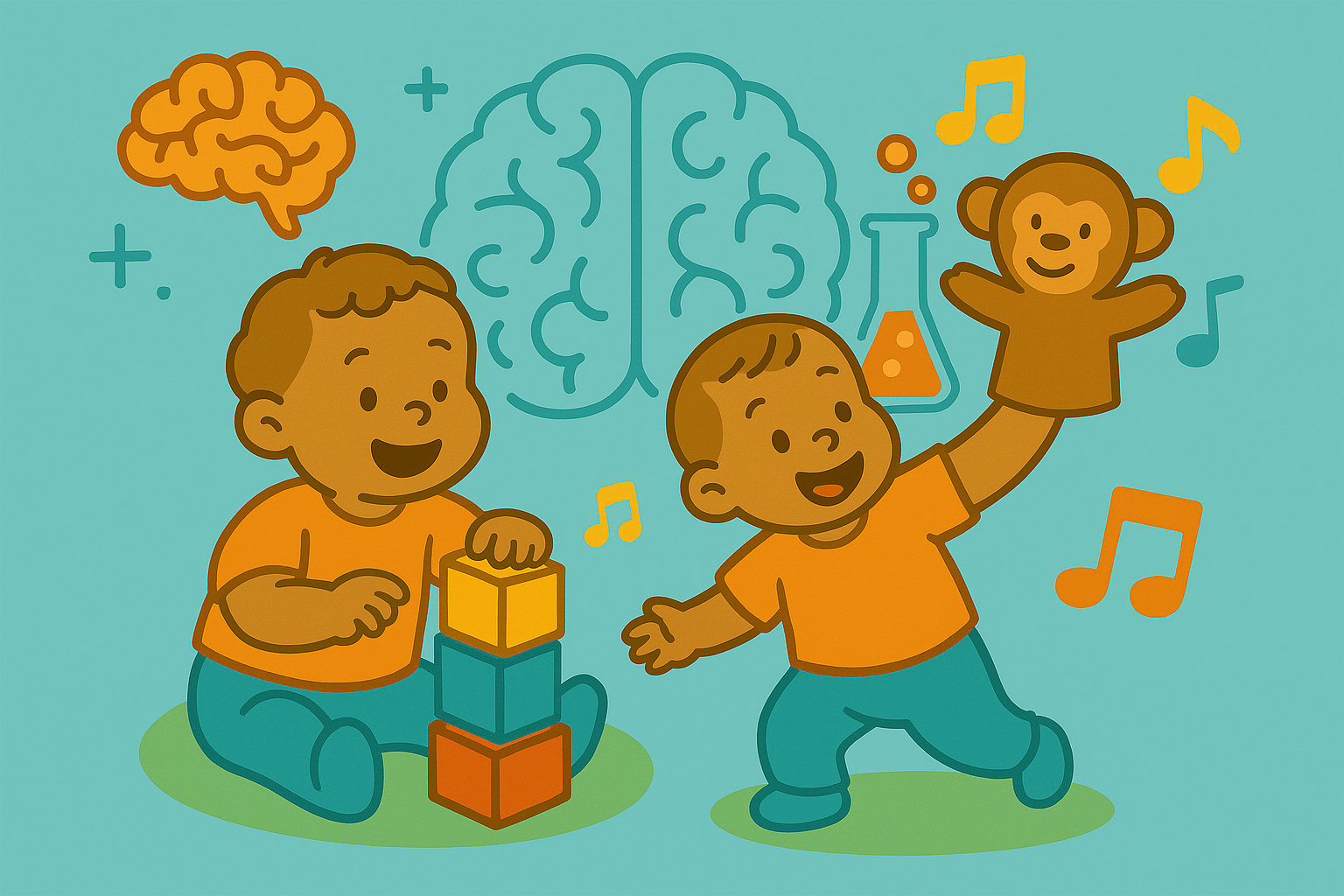The Science of Play and Brain Development
The Science of Play and Brain Development
Play is not just entertainment for young children—it is the primary way their brains grow, strengthen, and make sense of the world. Neuroscience research shows that during play, the brain forms new neural pathways, strengthens existing ones, and becomes more efficient at processing information. Play fuels emotional growth, social skills, creativity, language, and early problem-solving. It’s how children test ideas, explore possibilities, and rehearse real-world skills in a safe, joyful environment.
Why Play Is the Brain’s Favorite Way to Learn
Young children are not meant to sit still, memorize information, or follow rigid lessons. Their brains learn best through movement, sensory input, social interaction, and imaginative exploration.
Play supports:
Neural growth
Emotional regulation
Early executive function
Language development
Creativity
Social understanding
When kids play freely, their brains activate multiple learning systems simultaneously—something no worksheet can accomplish. Play strengthens every domain of development in a way that feels effortless.
How Play Builds the Brain’s Neural Pathways
The brain develops through repeated experiences. Every time a child stacks a block, narrates a story, or pretends to cook, neural connections fire. The more those connections fire, the stronger they become.
Play supports the brain by:
Strengthening synapses
Encouraging new neural growth
Building networks across different brain regions
Improving communication between emotional and logical centers
Supporting long-term memory formation
This kind of integrated learning also reflects the layered, experience-based growth highlighted in Turning Playtime Into a Language-Rich Experience, where interactions shape communication skills and cognitive development.
The Different Types of Play That Grow the Brain
Each type of play stimulates different areas of the brain. A balanced play diet helps children develop a wide range of skills.
Key types include:
Physical play – builds coordination, memory, and focus
Pretend play – strengthens language, empathy, and planning
Constructive play – grows problem-solving and spatial awareness
Artistic play – enhances creativity and fine-motor skills
Social play – supports emotional regulation and cooperation
Exploratory play – boosts curiosity and experimentation
Each category contributes to well-rounded cognitive development.
Pretend Play and the Developing Prefrontal Cortex
Pretend play—especially with puppets, costumes, or imaginative scenarios—activates the prefrontal cortex, the part of the brain responsible for planning, working memory, and flexible thinking. When a child plays “doctor,” “superhero,” or “family,” they are practicing complex cognitive skills without realizing it.
Pretend play strengthens:
Perspective-taking
Story sequencing
Emotional insight
Impulse control
Language skills
Symbolic thinking
This mirrors the storytelling benefits found in Using Puppet Conversations to Teach Vocabulary, where imagination fuels communication and emotional growth.
How Construction Play Supports Problem-Solving
Building with blocks, magnetic tiles, recycled materials, or loose parts gives children daily opportunities to reason, test ideas, and revise.
Construction play develops:
Spatial reasoning
Visual planning
Cause and effect understanding
Persistence
Scientific thinking
Coordination
Early engineering skills
Every toppled tower becomes a chance to try again—strengthening resilience as well as problem-solving.
Sensory Play and Brain Integration
Sensory play—touching, squishing, pouring, smelling, or manipulating textures—helps integrate the brain’s sensory pathways. These pathways are essential for emotional regulation, attention, and learning readiness.
Through sensory play, children strengthen:
Body awareness
Emotional grounding
Attention span
Sensory processing
Motor planning
This integration helps kids stay calm, focused, and prepared for more complex learning tasks later on.
Social Play and the Neuroscience of Relationships
Social play helps the brain build skills needed for communication, empathy, cooperation, and conflict resolution. During play with siblings or friends, the brain practices reading cues, managing feelings, and coordinating actions.
Social play supports:
Perspective-taking
Negotiation
Turn-taking
Empathy
Conflict resolution
Emotional regulation
These relational experiences connect directly to the growth described in Encouraging Empathy During Playtime Conflicts, where children learn to care, compromise, and communicate.
Moving the Body to Grow the Brain
Movement activates the cerebellum, a part of the brain deeply involved in attention, memory, and learning. When children jump, twirl, run, climb, and dance, they are improving more than their physical skills—they’re strengthening cognitive function.
Physical play boosts:
Focus
Working memory
Self-control
Coordination between brain hemispheres
Emotional release
This is why active, whole-body play is essential to learning—not a distraction from it.
How Play Strengthens Executive Function Skills
Executive function skills help children plan, focus, remember instructions, manage frustration, and adapt. Play is the natural way children practice these skills.
Executive function grows through:
Turn-taking during social play
Planning during pretend stories
Adjusting strategies during building tasks
Waiting during games
Persisting through art challenges
Managing emotions during tricky moments
These brain systems develop slowly and require lots of repetition—and play provides the perfect environment for practicing them joyfully.
Supporting Brain-Building Play at Home
Parents don’t need elaborate playrooms or expensive toys to support brain development. What matters is offering opportunities for exploration, creativity, and independence.
You can support brain-building play by:
Creating simple play invitations
Rotating toys to spark fresh interest
Providing open-ended materials
Giving children uninterrupted time to explore
Keeping the environment calm and accessible
Adding playful prompts when needed
Joining in the play without taking over
This kind of supportive environment helps children feel free to experiment, try new ideas, and build confidence in their abilities.
The science is clear: play is not optional. It is the foundation of brain development. Through play, children learn to solve problems, manage emotions, communicate ideas, and understand the world around them. Their brains grow stronger, more flexible, and more creative.
By offering time, space, and open-ended materials—and by trusting children’s natural creativity—families help children develop into curious, confident learners prepared for school, relationships, and lifelong exploration.
Play is not a break from learning. Play is learning. And the child who plays freely today becomes the innovative thinker of tomorrow.
This content is for educational purposes and is not a substitute for professional medical or psychological advice.
Popular Parenting Articles




